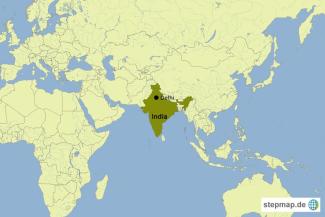Education
Scrimping and saving

Rahul goes to a private school located in a well-to-do suburb of Kolkata. His father is a helper in a small shop in North Kolkata while his mother cooks at other people’s houses. They struggle to make ends meet. Nonetheless, they opted for a private school that teaches in English when Rahul was young.
Today, Rahul is in class 5 and his father needs a bank loan to keep Rahul in that school. They also pay for private tuition, to help Rahul keep pace with his classmates from better economic backgrounds.
Roopa works as a cook for five households in North Delhi. Her three children were educated in a state-run school. Her oldest daughter, Gauri, has two children and sends them to a private school where she pays 1400 rupees per month. That is the equivalent of about € 200 euros – and India’s average income in 2013 only amounted to the equivalent of € 1100 euros. Gauri must live hand-to-mouth in order to pay the fees, but she feels it is worth it “if the children have a better future”.
These instances are not unique. As India’s economy has expanded over the past few decades, an increasing number of poor parents have begun to set aside money in order to send their children to private schools. They hope that will get them better job opportunities and help them to escape poverty. Many people who send their children to government schools, moreover, have begun to pay for additional private tuition. The understanding that education matters in life has spread wide.
According to India’s constitution, education is compulsory and free for all children in the age group six to 14 years. Education is provided by both the public and private sector. Irrespective of economic class, the reputation of state-run schools is not good however. Reasons include the absenteeism of teachers, poor infrastructure and the emphasis on local Indian languages.
“Knowledge of vernacular languages is important, but in order to find a good job in India one needs to be fluent in English,” says Mayuresh Banerjee, an IT professional who studied in a government school but wants his children to go to a missionary school. There is a wide range of private schools – some are not very expensive, while others charge substantial fees.
Deepan Biswas is a manager at an IT firm. His daughter is three years old and he has spent hours researching schools all over Kolkata. He says: “The track record of private school exam results is better than their government counterparts’ track record.” He appreciates that private schools take innovative approaches, but finds it irritating that “they keep finding ways of siphoning money from parents in the name of one event or another”.
People in remote areas often have no choices apart from the local government school. Rajender Prasad is a farmer in rural Uttar Pradesh. He wants his children to get an education that will allow them to move to a city and earn well. He says he cannot judge the quality of the local government school, but there is no alternative anyway. However, a youngster in the village offers paid tuition.
Prasun Bandyopadhyay is a teacher at a government school. In his eyes, the criticism of public-sector education is exaggerated. The conventional syllabus makes sense, he says, and its in-depth perspective means that there is little scope for extra-curricular activities. He admits that this is especially so if such activities require additional investments, for instance in computers. Many parents, however, think government schools are simply not up-to-date.
Not all people deem private education necessary, however. Surendar Kumar, an auto-rickshaw driver in Delhi, says: “I could only afford to send my children to a government school but I think they did pretty well for themselves. I agree that I tried to ensure that they got some additional tuition but I really believe that if a child wants to study then they can study in any environment.”
Roli Mahajan is a journalist based in Delhi.
roli.mahajan@gmail.com













